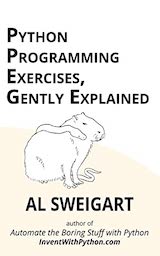
|
FreeComputerBooks.com
Links to Free Computer, Mathematics, Technical Books all over the World
|
|
- Title: Python Programming Exercises, Gently Explained
- Author(s) Al Sweigart
- Publisher: No Starch Press (September 29, 2022); eBook (Read Online)
- Hardcover/Paperback: N/A
- eBook: HTML
- Language: English
- ISBN-10/ASIN: B0BGYJ7G6T
- ISBN-13: N/A
- Share This:

|
This is the perfect book for beginner and intermediate programmers who want to test their Python skills but aren’t ready to begin professional-level software development. The 42 programming exercises in this book let you practice what you've learned.
About the Authors- Al Sweigart (Albert Sweigart) is a software developer and teaches programming to kids and adults. He has written several Python books for beginners, including Automate the Boring Stuff with Python, Hacking Secret Ciphers with Python, Invent Your Own Computer Games with Python, and Making Games with Python and Pygame.
 Similar Books:
Similar Books:
-
 Architecture Patterns with Python (Harry Percival, et al.)
Architecture Patterns with Python (Harry Percival, et al.)
Enabling Test-Driven Development, Domain-Driven Design, and Event-Driven Microservices, it introduces proven architectural design patterns to help Python developers manage application complexity, and get the most value out of test suites.
-
 Python Packages (Tomas Beuzen, et al.)
Python Packages (Tomas Beuzen, et al.)
An open source book that describes modern and efficient workflows for creating Python packages. Covering the entire Python packaging life cycle, this essential guide takes readers from package creation all the way to effective maintenance and updating.
-
 Practical Python Projects (Yasoob Khalid)
Practical Python Projects (Yasoob Khalid)
This book demonstrates how to combine different libraries and frameworks to build amazing things. It picks up where the complete beginner books leave off, expanding on existing concepts and introducing new tools that you'll use every day.
-
 Clean Architectures in Python (Leonardo Giordani)
Clean Architectures in Python (Leonardo Giordani)
The clean architecture is the opposite of spaghetti code, where everything is interlaced and there are no single elements that can be easily detached from the rest and replaced without the whole system collapsing.
-
 Automate the Boring Stuff with Python (Albert Sweigart)
Automate the Boring Stuff with Python (Albert Sweigart)
Learn how to use Python to write programs that do in minutes what would take you hours to do by hand - no prior programming experience required. You'll create Python programs that effortlessly perform useful and impressive feats of automation.
-
 Python for Everybody: Exploring Data in Python 3
Python for Everybody: Exploring Data in Python 3
This book is designed to introduce students to programming and software development through the lens of exploring data. You can think of the Python programming language as your tool to solve data problems that are beyond the capability of a spreadsheet.
-
 O'Reilly® Think Python, 2nd Edition (Allen B. Downey)
O'Reilly® Think Python, 2nd Edition (Allen B. Downey)
This hands-on guide takes you through the Python programming language a step at a time, beginning with basic programming concepts before moving on to functions, recursion, data structures, and object-oriented design. 2nd edition updated for Python 3.
-
 Fundamentals of Python Programming (Richard L. Halterman)
Fundamentals of Python Programming (Richard L. Halterman)
It focuses on introducing programming techniques and developing good habits. To that end, our approach avoids some of the more esoteric features of Python and concentrates on the programming basics that transfer directly to other imperative programming.
-
 Problem Solving with Algorithms/Data Structures using Python
Problem Solving with Algorithms/Data Structures using Python
This is a textbook about computer science. It is also about Python. However, there is much more. The tools and techniques that you learn here will be applied over and over as you continue your study of computer science.
-
 O'Reilly® Python Data Science Handbook: Essential Tools
O'Reilly® Python Data Science Handbook: Essential Tools
Several resources exist for individual pieces of this data science stack, but only with the Python Data Science Handbook do you get them all - IPython, NumPy, Pandas, Matplotlib, Scikit-Learn, and other related tools.
-
 Modeling and Simulation in Python (Allen B. Downey)
Modeling and Simulation in Python (Allen B. Downey)
This book is an introduction to physical modeling using a computational approach with Python. You will learn how to use Python to accomplish many common scientific computing tasks: importing, exporting, and visualizing data; numerical analysis; etc.






